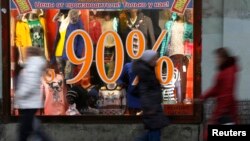In Blagoveshchensk on Russia's side of the Chinese border, Mou Jiani has turned her home into a warehouse, stocking up on Apple Inc iPhones, handbags and milk powder to sell back home as Chinese shoppers take advantage of the rouble's slide.
Chinese workers and overseas students in Russia have been snapping up goods at low prices caused by the steep fall in Russian ruble rates before brands can adjust them.
These shopping “agents”, knows as “daigou”, stockpile the products before selling them at a profit to buyers back home.
“In the last few weeks more people have contacted me on messaging apps Weibo and WeChat than I have time to reply to,” said Mou, a trading company worker, who acts as a daigou in her spare time.
The most popular items include smart phones, shoes, handbags and watches, she said.
Shoppers usually pay using Alibaba's Alipay system on her personal Taobao website, after which she ships the products back to China. Her website received over 3,000 visits on Thursday, a sharp rise from previous levels, she said.
Firms have moved to hike prices or even halt sales, but nifty shoppers have still been able to buy up products on the cheap.
A Louis Vuitton bag in Russia cost just over half the Chinese price on Wednesday, one daigou said.
These shopping agents are not new for Chinese shoppers, who often look abroad to buy luxury items to bypass steep import taxes at home.
However, posts on China's Twitter-like Weibo asking about “Russian Daigou” soared this month to close to ten thousand from a couple of hundred each month before.
“I hear buying luxury goods is as cheap as buying cabbage,” one Weibo user wrote online on Thursday.
'Ranking in thousands'
Other agents said Chinese shopper numbers started to spike after the ruble fell 11 percent against the dollar on Tuesday. It is down around 45 percent this year.
Walking around Moscow's upmarket GUM department store on Red Square, a Chinese student who wrote her name as Chzhen Khuey, 24, said buying goods in Russia for stores in China was a lucrative business.
“Chinese stores put money on your debit card and you use the card to make purchases here; clothes, handbags, whatever. Famous brands are very cheap now.”
But a saleswoman at a Bulgari store nearby said almost all of her buyers had been Russians, and locals have rushed to buy cars, electronic goods and designer clothes.
The retail opportunity has also taken off in Kazakhstan, bordering Russia to the south.
“The turnover of goods with Kazakhstan has soared,” said Ivan Gorbachev, a 28-year-old manager at Russian trade and logistics company Sibir ImpEx in the southern city of Novosibirsk.
“They [Kazakhs] are stocking up to fill their own warehouses,” he told Reuters by telephone.
Chinese consumers, meanwhile, have been quick to respond, although some remain wary of fakes and fluctuating prices.
“I have concerns about the risks because I usually buy from the United States or Japan. I'm worried about fake things, but if prices are much cheaper than here then I will buy,” said Shanghai-based student Liu Kiko.
Consumers like Liu may have to act quickly as firms look to hike prices or pull sales. Apple said this week it had taken down its online store in Russia due to extreme fluctuations in the value of the ruble.
“There's really just a small window to manipulate the drop,” said Ben Cavender, Shanghai-based principal at China Market Research Group.
Where price gaps emerge, however, Chinese daigou said they could make sizeable profits.
One daigou, surnamed Pan, who is studying in Moscow, said he had started selling luxury products like watches and jewelry in the last few days.
“It's not a pipe dream to rake in thousands [of dollars] in just one night,” he said.









